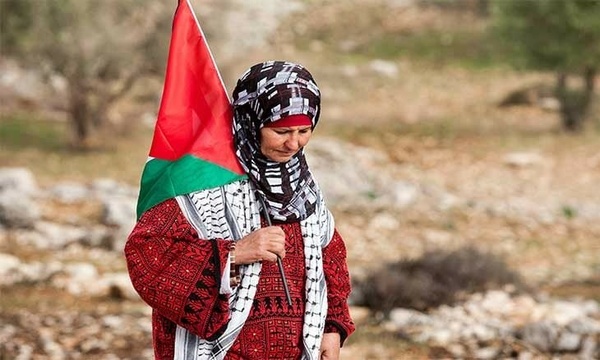
Bethlehem – Saba:
The Palestinian Women’s Movement “Al-Karama” on Wednesday called on women across the world to stand in solidarity with Palestinian women—especially in Gaza—and to sever ties with Zionist feminist organizations.
The movement also demanded the immediate release of Palestinian female prisoners held in Israeli occupation jails.
In a statement, Al-Karama urged women worldwide to designate August 16 and 17 as global days of solidarity with the struggle of Palestinian women, amid the ongoing crimes committed by the Israeli occupation.
The movement highlighted that women in Gaza face daily genocide, starvation, and forced displacement under Israeli firepower and continuous bombardment using American and European weaponry. This, it said, requires a broad international feminist mobilization to break the silence and confront these brutal policies.
Al-Karama called for a complete boycott of Zionist feminist organizations, describing them as colonial tools that contradict the principles of human solidarity and women’s liberation.
“At this critical juncture in our struggle, we call on the women of the world to boycott Zionist feminist organizations complicit in whitewashing the image of the Israeli occupation,” the statement read.
The Palestinian feminist movement also urged the rejection of all forms of normalization with Zionist feminist entities operating under misleading banners such as "dialogue," "peace," and "women’s activism"—terms it says are used to mask the crimes of the Israeli occupation and mislead global public opinion.
Al-Karama called for organizing feminist and grassroots actions led by revolutionary women, as a powerful expression of free voices standing with Palestinian women in Gaza.
The movement also called on the world to support the resilience of Gaza’s women in the face of genocidal starvation and war crimes committed by the Israeli enemy, and to strengthen the shared struggle for national and social liberation.
It further called for the launch of a wide-scale grassroots campaign demanding the immediate release of Palestinian female prisoners, especially those who are ill or underage, along with the release of all detainees held in Israeli prisons.
The campaign, the movement noted, is aligned with the efforts of the "Samidoun Network" in defense of Palestinian prisoners.
The statement emphasized the need for a comprehensive boycott of all products linked to the Israeli occupation, describing them as tools that fund the war machine. It also called for an academic and institutional boycott of Zionist entities complicit in settler-colonialism and in producing narratives of dominance and racism.
Al-Karama extended a special revolutionary salute to the women of Africa, Latin America, Asia, and Indigenous communities worldwide who have firmly stood with the Palestinian struggle.
It praised their participation in blockade-breaking campaigns and their response to Gaza’s call. The movement also saluted Black women in the United States—fighters against racism and inspirations in their struggle for freedom and justice.
Concluding, the movement emphasized—through its multilingual statement—the unity of women’s struggles across the globe against colonialism, Zionism, and the Israeli occupation.
The Palestinian Women’s Movement “Al-Karama” on Wednesday called on women across the world to stand in solidarity with Palestinian women—especially in Gaza—and to sever ties with Zionist feminist organizations.
The movement also demanded the immediate release of Palestinian female prisoners held in Israeli occupation jails.
In a statement, Al-Karama urged women worldwide to designate August 16 and 17 as global days of solidarity with the struggle of Palestinian women, amid the ongoing crimes committed by the Israeli occupation.
The movement highlighted that women in Gaza face daily genocide, starvation, and forced displacement under Israeli firepower and continuous bombardment using American and European weaponry. This, it said, requires a broad international feminist mobilization to break the silence and confront these brutal policies.
Al-Karama called for a complete boycott of Zionist feminist organizations, describing them as colonial tools that contradict the principles of human solidarity and women’s liberation.
“At this critical juncture in our struggle, we call on the women of the world to boycott Zionist feminist organizations complicit in whitewashing the image of the Israeli occupation,” the statement read.
The Palestinian feminist movement also urged the rejection of all forms of normalization with Zionist feminist entities operating under misleading banners such as "dialogue," "peace," and "women’s activism"—terms it says are used to mask the crimes of the Israeli occupation and mislead global public opinion.
Al-Karama called for organizing feminist and grassroots actions led by revolutionary women, as a powerful expression of free voices standing with Palestinian women in Gaza.
The movement also called on the world to support the resilience of Gaza’s women in the face of genocidal starvation and war crimes committed by the Israeli enemy, and to strengthen the shared struggle for national and social liberation.
It further called for the launch of a wide-scale grassroots campaign demanding the immediate release of Palestinian female prisoners, especially those who are ill or underage, along with the release of all detainees held in Israeli prisons.
The campaign, the movement noted, is aligned with the efforts of the "Samidoun Network" in defense of Palestinian prisoners.
The statement emphasized the need for a comprehensive boycott of all products linked to the Israeli occupation, describing them as tools that fund the war machine. It also called for an academic and institutional boycott of Zionist entities complicit in settler-colonialism and in producing narratives of dominance and racism.
Al-Karama extended a special revolutionary salute to the women of Africa, Latin America, Asia, and Indigenous communities worldwide who have firmly stood with the Palestinian struggle.
It praised their participation in blockade-breaking campaigns and their response to Gaza’s call. The movement also saluted Black women in the United States—fighters against racism and inspirations in their struggle for freedom and justice.
Concluding, the movement emphasized—through its multilingual statement—the unity of women’s struggles across the globe against colonialism, Zionism, and the Israeli occupation.